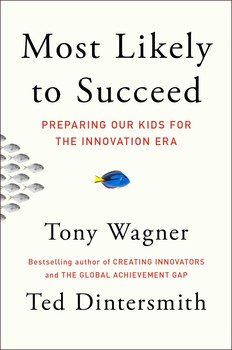Most Likely to Succeed: Preparing Our Kids for the Innovation Era
Tony Wagner and Ted Dintersmith Scribner, 2015, 296 pp. Principal, January/February 2016
 Tony Wagner and Ted Dintersmith
Tony Wagner and Ted Dintersmith
Scribner, 2015, 296 pp.
Principal, January/February 2016
What’s wrong with the American education system and how can we fix it? In Most Likely to Succeed, the authors explore the history of education in America and offer readers their vision on what needs to be done to improve teaching and learning. Tony Wagner, an educator, speaker, writer, and Harvard graduate, paired up with Ted Dintersmith, a Stanford-educated venture capitalist and technology innovator, to “explore the contradiction between what students must do to earn a high school or college degree versus what makes them most likely to succeed in the world of work, citizenship, and lifelong learning.”
The title made me hopeful that this book would go beyond criticism and a historical review of how we’ve gotten to where we are. Unfortunately, only 45 out of 296 pages are dedicated to the authors’ vision of what the American education system should be. They start by questioning the value Americans place on academic credentials. They note, “Despite our enormous investment in education, the majority of our students lack the skills necessary to get a good job, be an informed citizen, or—in some way that defies crisp definition—be a good and happy person.”
Wagner and Dintersmith examine what constitutes real learning, explore what is at stake if nothing changes, expose the roots of modern education, ponder the value of a college education, and decry the overemphasison testing. The picture they paint is both bleak and familiar. But educators know the system is broken; they want to know what to do about it.
The final chapter begins to address “the fix.” The authors want to create a new vision by reframing the problem, creating new outcomes, and setting a new purpose for education. While simple ideas are on the surface, the execution of the plan is much more complex. Wagner and Dintersmith give readers a taste of what just might work in reforming the American education system. Unfortunately, it’s a taste that leaves the reader hungry for more.
Reviewed by Christopher Wooleyhand, principal of Richard Henry Lee Elementary School in Glen Burnie, Maryland, and adjunct instructor of teacher leadership at McDaniel College.
Copyright © National Association of Elementary School Principals. No part of the articles in NAESP magazines, newsletters, or website may be reproduced in any medium without the permission of the National Association of Elementary School Principals. For more information, view NAESP’s reprint policy.

